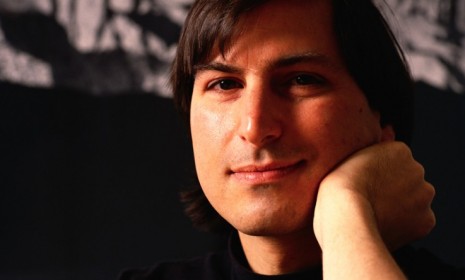Listen to the 1983 Steve Jobs speech that predicted the iPad
Addressing a small audience nearly 30 years ago, the late Apple boss revealed nascent thoughts on tablets, the App Store, and even Siri

A free daily email with the biggest news stories of the day – and the best features from TheWeek.com
You are now subscribed
Your newsletter sign-up was successful
In 1983, Apple was a company still finding its legs, and a large swath of the general public hadn't the faintest idea what a computer did, let alone actually owning one. "For context, the Macintosh hadn't even been released yet," says Casey Chan at Gizmodo. "Michael Jackson just moonwalked for the very first time and Ronald Reagan started talking about Star Wars missiles." That same year, Steve Jobs gave a small speech at an event called the International Design Conference in Aspen, and detailed Apple's eerily prescient vision for the future, hinting at plans for the iPad and Siri. Now, the entirety of the audio is available online thanks to Marcel Brown at the blog Life, Liberty, and Technology. (Listen to it below.) Here, five highlights from Jobs' spookily accurate predictions:
1. He predicted that every home would have a computer
Jobs correctly stated that "in a few years people will be spending more time interacting with personal computers than with cars," says Brown. "It seems so obvious now," but it was hardly a guarantee back then. He was bullish in his belief that the personal computer would become commonplace, and "bemoaned the fact that California graduated more plumbers than it did computer engineers," says Jason D. O'Grady at ZDNet.
The Week
Escape your echo chamber. Get the facts behind the news, plus analysis from multiple perspectives.

Sign up for The Week's Free Newsletters
From our morning news briefing to a weekly Good News Newsletter, get the best of The Week delivered directly to your inbox.
From our morning news briefing to a weekly Good News Newsletter, get the best of The Week delivered directly to your inbox.
2. He had begun imagining the iPad
Cell phones didn't really even exist yet, but Jobs was insistent that mobile computing devices were the future. He envisioned an "incredibly great computer in a book that you can carry around with you," which sounds "a lot like the iPad that Apple would release 27 years later," says Casey Newton at CNET.
3. And (sort of) referenced Google Street View
In his speech, Jobs mentioned a special mapping project being conducted by researchers at MIT. Little did he know that this would eventually contribute to Google's Street View.
A free daily email with the biggest news stories of the day – and the best features from TheWeek.com
4. He was already pondering the App Store
The late Apple founder compared the budding computer software industry to the record industry. He argued that most people had no idea what kind of computer or software they needed, while those same people could walk into a record store and head straight for the music they liked. He wanted to change that, and believed that software distribution "through traditional brick-and-mortar was archaic since software is digital and can be transferred electronically through phone lines," says Brown. Plus, Jobs said, payments would eventually be made electronically with credit cards. "I don't know about you, but this sounds incredibly similar to the concept of the Apple App Store."
5. And Siri, too
Toward the end of the talk, Jobs was asked about voice recognition. He tells the audience that speech-command technology was likely more than a decade away. "Given the context of Siri today, it is interesting to hear him talk about the difficulty of recognizing language vs. voice because language is contextually driven," says Brown. Said Jobs himself: "This stuff is hard."
Listen here:
Sources: CNET, Gizmodo, Life, Liberty, and Technology, ZDNET
-
 How the FCC’s ‘equal time’ rule works
How the FCC’s ‘equal time’ rule worksIn the Spotlight The law is at the heart of the Colbert-CBS conflict
-
 What is the endgame in the DHS shutdown?
What is the endgame in the DHS shutdown?Today’s Big Question Democrats want to rein in ICE’s immigration crackdown
-
 ‘Poor time management isn’t just an inconvenience’
‘Poor time management isn’t just an inconvenience’Instant Opinion Opinion, comment and editorials of the day